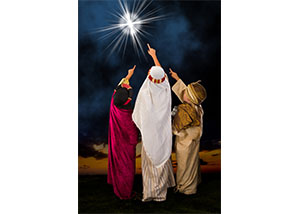As Mary sat all alone, her thoughts wandered back over time to an event that had taken place decades earlier. In her mind’s eye, she now saw the faces of the three Kings as clearly as if she had seen them only yesterday. Casper was a pudgy, red-faced Arab with a spotlessly white turban and coal-black beard. Melchior had almond eyes and a pointed beard, and he wore a crown adorned with a gold crescent moon. Balthasar’s serious black eyes peered out from a face as dark as ebony. Mary recalled that all three bore gifts. The Magi had knelt down simultaneously, but they took turns in presenting their treasures to her child.
Casper opened his coffer and presented little Jesus with a very generous amount of gold. “I am a king,” he said solemnly. “I give to you the most precious thing I have. You too are a king, and when you are older, you will give to the world a gift far more precious than gold.”
Melchior was next to make his presentation. He brought forth a small wooden chest brim full of aromatic frankincense. His speech contained a further note of prophecy: “I am a king. I give to you this fragrant substance. In my country, the priests use it to appease the anger of God. You are a king, and when you are older, you will give to the world something far more efficacious in appeasing divine wrath.” At that moment, the little infant in Mary’s arms gave a sudden start, as if he were, for the briefest instant, in intense pain.
Now it was Balthasar’s turn to present his gift—an engraved silver casket filled with myrrh. “I am a king, and I bring you this precious perfume associated with death and burial. You also are a king, and when you are older, you will bestow a gift made possible by your own death.”
This last memory drove a dart of anguish through Mary’s heart, and the freshness of that pain was enough to rouse her from her daydream.
She was alone on that first Good Friday, her cheeks wet with tears as she gently cradled the lifeless body of her Son in her arms. His limbs were completely cold now. The Magi had been all too accurate in their prophecies. Jesus had indeed given the world something far more precious than gold, something to appease the wrath of God, something made possible by His own death. He had given the world His most precious Blood.
*************************
Today, as the Church celebrates the Feast of the Epiphany, we rightly remember the three Kings and the gifts they offered the Christ-child. Yet perhaps we would do well also to remember the treasure that Jesus has given to us. Our Lord’s Blood is poured out for us in the sacraments, most especially in the sacrament of Confession and in the sacrament of the Holy Eucharist. Archbishop Fulton Sheen said that when a priest absolves in Confession, Christ’s blood literally drips from his hands—a cleansing bath that makes us truly clean. Through the Holy Eucharist, Jesus’ Blood nourishes us and renews the life of grace within us. What a wonderful gift we have in the Blood of Christ! What is amazing is that this gift is poured out for us without limit. There is no end to the life-giving stream of Jesus’ Blood.
We all know that earth’s resources are limited. Thus it is a good idea to switch off the lights so as not to waste electricity, to turn off the faucet so as not to waste water. Yet precisely because Our Lord’s precious Blood is poured out for us without limit, we ought to open up our hearts without reserve to receive this most costly of gifts. To close our hearts to the Blood of Christ, to His grace, would be a terrible waste.
Consider the difference between fossil fuels on the one hand and wind and solar energy on the other. To burn fossil fuels—oil and coal—indiscriminately would be irresponsible. Why? Because these resources are limited. Yet not to take advantage of wind and solar power would be equally irresponsible. Why? Because these resources are relatively unlimited. We waste fossil fuels by burning them without care. We waste wind and solar energy by not tapping into it. It is the same with Our Lord’s Precious Blood. Not to take advantage of the Blood of Christ, poured forth in the Sacraments, would be a tragic waste. This is all the more true because Our Lord’s Blood is so precious. Christ’s Blood is precious, not because it is scarce—it flows with great abundance. The Blood of Jesus is precious because it has been obtained for us through great love and at great cost. Not to avail ourselves of this gift would be a terrible, terrible waste, a sign of great ingratitude.
Lord Jesus, You were grateful for the gifts of gold, frankincense, and myrrh offered to You by the Magi. May we be grateful for Your Most Precious Blood, poured forth in the Sacraments. Allow us to open our hearts without reserve to this most cleansing and nourishing stream. May we never waste a single drop of so abundant and yet so precious a resource. We ask this in Your Holy Name. Amen.

